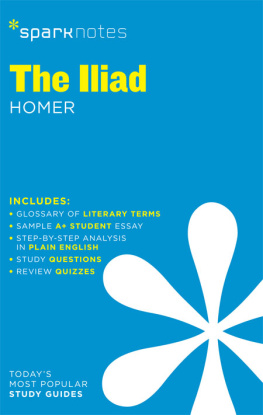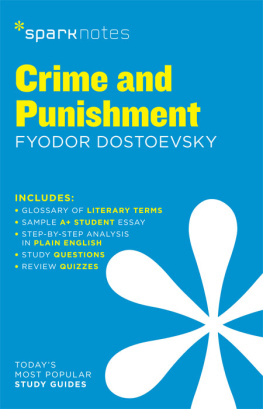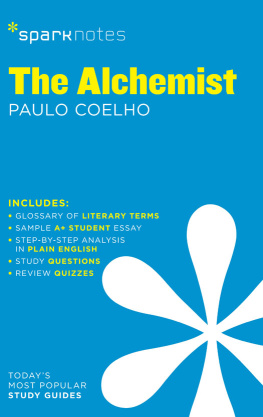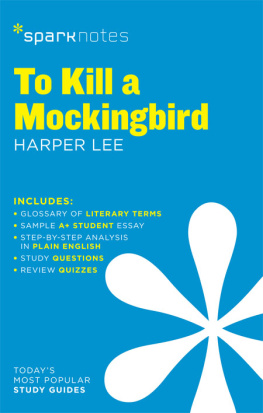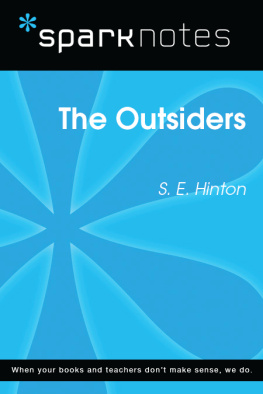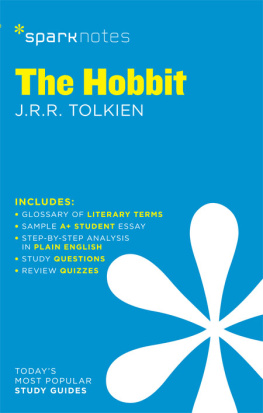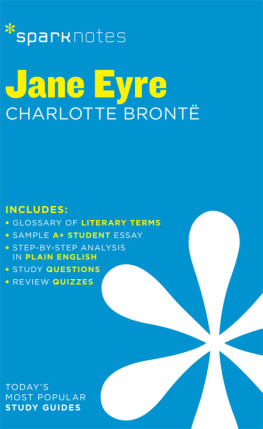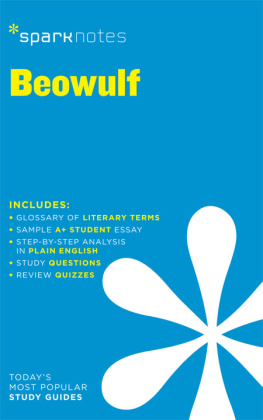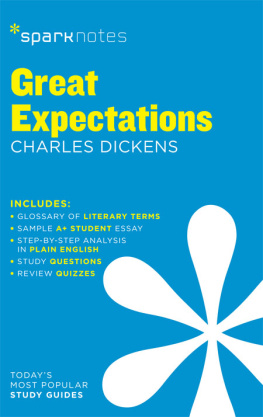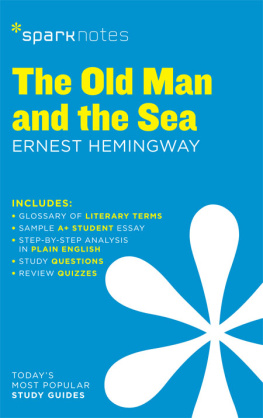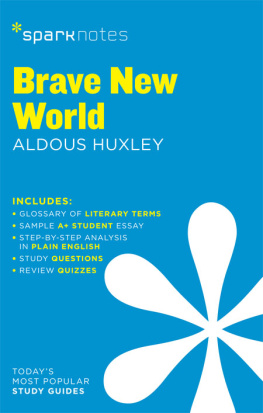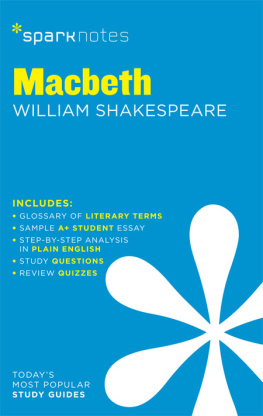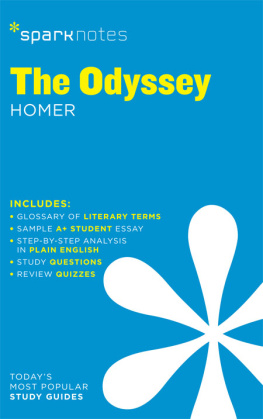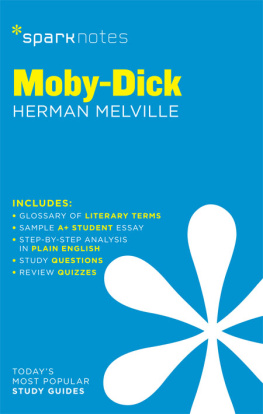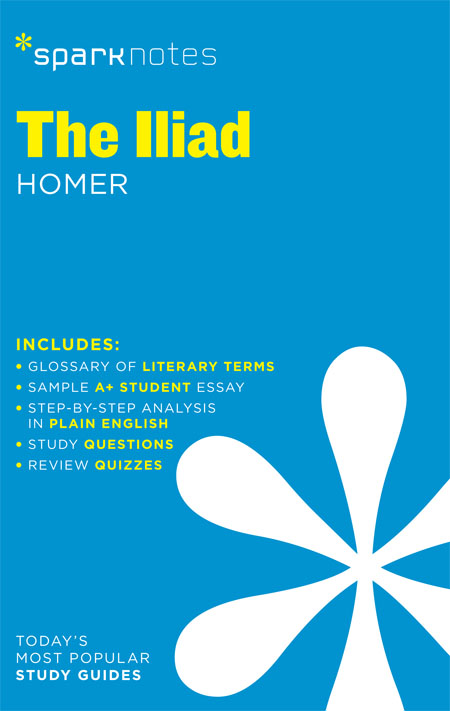The Iliad
Homer
2003, 2007 by Spark Publishing
This Spark Publishing edition 2014 by SparkNotes LLC, an Affiliate of Barnes & Noble
All rights reserved. No part of this publication may be reproduced, stored in a retrieval system, or transmitted in any form or by any means (including electronic, mechanical, photocopying, recording, or otherwise) without prior written permission from the publisher.
Sparknotes is a registered trademark of SparkNotes LLC
Spark Publishing
A Division of Barnes & Noble
120 Fifth Avenue
New York, NY 10011
www.sparknotes.com /
ISBN-13: 978-1-4114-7167-2
Please submit changes or report errors to www.sparknotes.com/errors.
10 9 8 7 6 5 4 3 2 1
Context
N early three thousand years after they were composed, The Iliad and The Odyssey remain two of the most celebrated and widely read stories ever told, yet next to nothing is known about their composer. He was certainly an accomplished Greek bard, and he probably lived in the late eighth and early seventh centuries b.c. Authorship is traditionally ascribed to a blind poet named Homer, and it is under this name that the works are still published. Greeks of the third and second centuries b.c. , however, already questioned whether Homer existed and whether the two epics were even written by a single individual.
Most modern scholars believe that even if a single person wrote the epics, his work owed a tremendous debt to a long tradition of unwritten, oral poetry. Stories of a glorious expedition to the East and of its leaders fateful journeys home had been circulating in Greece for hundreds of years before The Iliad and The Odyssey were composed. Casual storytellers and semiprofessional minstrels passed these stories down through generations, with each artist developing and polishing the story as he told it. According to this theory, one poet, multiple poets working in collaboration, or perhaps even a series of poets handing down their work in succession finally turned these stories into written works, again with each adding his own touch and expanding or contracting certain episodes in the overall narrative to fit his taste.
Although historical, archaeological, and linguistic evidence suggests that the epics were composed between and 650 b.c. they are set in Mycenaean Greece in about the twelfth century b.c. , during the Bronze Age. This earlier period, the Greeks believed, was a more glorious and sublime age, when gods still frequented the earth and heroic, godlike mortals with superhuman attributes populated Greece. Because the two epics strive to evoke this pristine age, they are written in a high style and generally depict life as it was believed to have been led in the great kingdoms of the Bronze Age. The Greeks are often referred to as Achaeans, the name of a large tribe occupying Greece during the Bronze Age.
But Homers reconstruction often yields to the realities of eighth- and seventh-century b.c. Greece. The feudal social structure apparent in the background of The Odyssey seems more akin to Homers Greece than to Odysseuss, and Homer substitutes the pantheon of deities of his own day for the related but different gods whom Mycenaean Greeks worshipped. Many other minor but obvious anachronismssuch as references to iron tools and to tribes that had not yet migrated to Greece by the Bronze Agebetray the poems later, Iron Age origins.
For centuries, many scholars believed that the Trojan War and its participants were entirely the creation of the Greek imagination. But in the late nineteenth century, an archaeologist named Heinrich Schliemann declared that he had discovered the remnants of Troy. The ruins that he uncovered sit a few dozen miles off of the Aegean coast in northwestern Turkey, a site that indeed fits the geographical descriptions of Homers Troy. One layer of the site, roughly corresponding to the point in history when the fall of Troy would have taken place, shows evidence of fire and destruction consistent with a sack. Although most scholars accept Schliemanns discovered city as the site of the ancient city of Troy, many remain skeptical as to whether Homers Trojan War ever really took place. Evidence from Near Eastern literature suggests that episodes similar to those described in The Iliad may have circulated even before Schliemanns Troy was destroyed. Nonetheless, many scholars now admit the possibility that some truth may lie at the center of The Iliad, hidden beneath many layers of poetic embellishment.
Like The Odyssey,The Iliad was composed primarily in the Ionic dialect of Ancient Greek, which was spoken on the Aegean islands and in the coastal settlements of Asia Minor, now modern Turkey. Some scholars thus conclude that the poet hailed from somewhere in the eastern Greek world. More likely, however, the poet chose the Ionic dialect because he felt it to be more appropriate for the high style and grand scope of his work. Slightly later Greek literature suggests that poets varied the dialects of their poems according to the themes that they were treating and might write in dialects that they didnt actually speak. Homers epics are Panhellenic (encompassing all of Greece) in spirit and use forms from several other dialects. This suggests that Homer suited his poems to the dialect that would best complement his ideas.
The Aftermath of the Iliad
The Trojan War has not yet ended at the close of The Iliad. Homers audience would have been familiar with the struggles conclusion, and the potency of much of Homers irony and foreboding depends on this familiarity. What follows is a synopsis of some of the most important events that happen after The Iliad ends.
The Death of Achilles
In the final books of The Iliad, Achilles refers frequently to his imminent death, about which his mother, Thetis, has warned him. After the end of the poem, at Hectors funeral feast, Achilles sights the beautiful Polyxena, the daughter of Priam and hence a princess of Troy. Taken with her beauty, Achilles falls in love with her. Hoping to marry her, he agrees to use his influence with the Achaean army to bring about an end to the war. But when he travels to the temple of Apollo to negotiate the peace, Paris shoots him in the heelthe only vulnerable part of his bodywith a poisoned arrow. In other versions of the story, the wound occurs in the midst of battle.
Achilles Armor and the Death of Ajax
After Achilles death, Ajax and Odysseus go and recover his body. Thetis instructs the Achaeans to bequeath Achilles magnificent armor, forged by the god Hephaestus, to the most worthy hero. Both Ajax and Odysseus covet the armor; when it is awarded to Odysseus, Ajax commits suicide out of humiliation.
The Palladium and the Arrows of Heracles
By the time of Achilles and Ajaxs deaths, Troys defenses have been bolstered by the arrival of a new coalition of allies, including the Ethiopians and the Amazons. Achilles killed Penthesilea, the queen of the Amazons, before his death, but the Trojans continue to repel the Achaean assault. The gods relay to the Achaeans that they must perform a number of tasks in order to win the war: they must recover the arrows of Heracles, steal a statue of Athena called the Palladium from the temple in Troy, and perform various other challenges. Largely owing to the skill and courage of Odysseus and Diomedes, the Achaeans accomplish the tasks, and the Achaean archer Philoctetes later uses the arrows of Heracles to kill Paris. Despite this setback, Troy continues to hold against the Achaeans.

